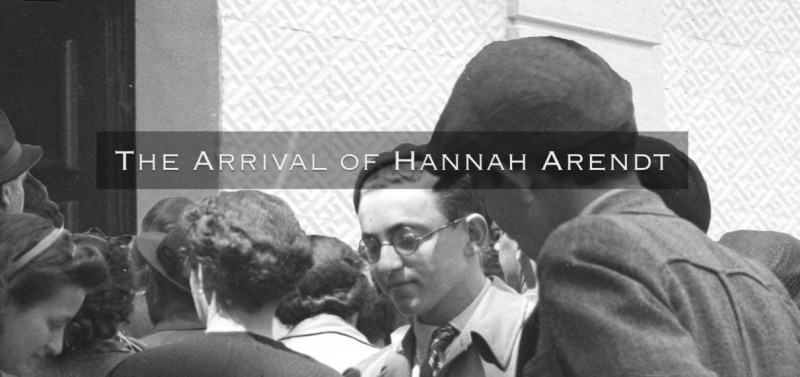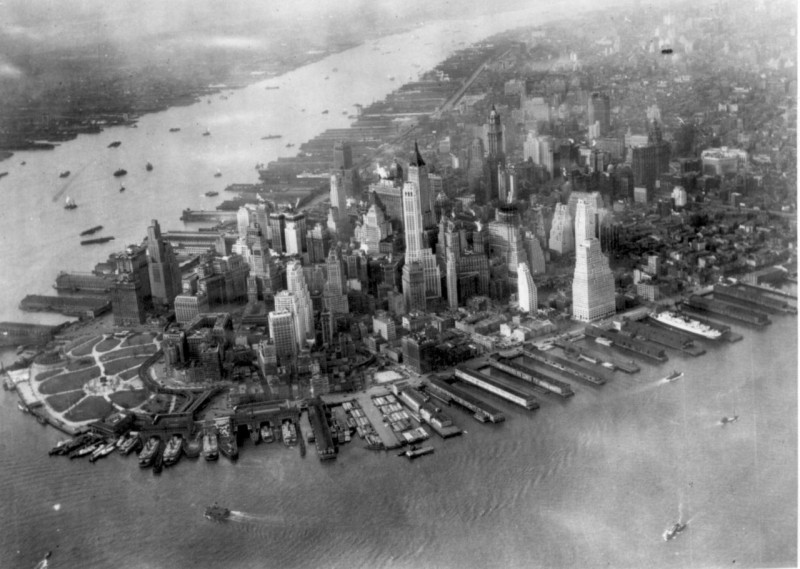
The Arrival of Hannah Arendt
This film describes the arrival of Hannah Arendt - a Jewish, German-American political theorist and publicist - in New York and her reflections on flight and helping people start over.

Für mich ist New York der Ort, wo meine lebensgeschichtlich wichtigen Freunde wohnen. In dieser Stadt bin ich glücklich gewesen, deshalb bin ich zurückgekehrt. Hier fühle ich mich geborgen, es ist, als ob ich immer hier gewesen wäre. Dabei sind’s 45 Jahre, länger als mein halbes Leben. Ich denke kaum an die Zeit zurück, die ich in Deutschland verbracht habe. Das ist für mich ein fremdes Land. 1960 bin ich das erste Mal wieder nach Deutschland gereist. Wir wollten die Gräber sehen, den Friedhof in Frankfurt. Dort liegen die Grosseltern meines Mannes und frühere Freunde von mir, Patienten, mit denen ich herzlich verbunden war, auch Kolleginnen, Schwestern, die sich das Leben genommen haben. Ich wollte auch meine alte Wirkungsstätte wiedersehen. Aber die Stadt, Frankfurt, war mir fremd geworden.
[…]
Sprache ist wie ein Gehäuse, in das man hineingeborgen wird. Und als ich in Amerika begonnen habe, mit meinem Mann Englisch zu sprechen, war das für mich ein Zeichen, dass ich das Land, das mich aufgenommen hat, innerlich akzeptiert habe. Diese Sprache wurde uns geläufig. Mein Mann hat ein gutes Englisch gesprochen, trotz seines Frankfurter Akzents, den er zeitlebens beibehielt. Als ich am 6. Juni 1944 amerikanische Staatsbürgerin wurde, habe ich voller Stolz gesagt: I’m better American, than many who are born here. Wir waren froh, Amerikaner zu sein. Das heisst, mein Mann erhielt vier Monate nach mir die amerikanische Staatsbürgerschaft. Am Abend sagte ich zu ihm im Scherz: Jetzt brauche ich mit keinem German mehr zu schlafen.
Was von Deutschland geblieben ist? Persönlich hab‘ ich’s nie anders können, als die mir gestellten Aufgaben gewissenhaft zu erfüllen. Die deutsche Gründlichkeit, das liegt doch einem im Blut. Hier in Washington Heights gibt es eine deutsche Emigrantenkolonie, die nannte sich das Vierte Reich, damals als wir hierher zogen. Es mögen noch so viele verschiedene Juden aus Deutschland hier wohnen, gemeinsam ist allen der Rauswurf aus dem Dritten Reich. Und dieser Teil deutscher Geschichte bleibt mit uns verbunden.
Gemeinsam ist den Menschen hier im Vierten Reich auch die enorme Umstellungsleistung. Was immer sie geworden sind, Professoren, Rechtsanwälte, Kaufleute und Lehrer, auch Ärzte, sie haben alle neu in diesem Land beginnen müssen. Wir haben hart gearbeitet, um es wieder zu etwas zu bringen. Und wir haben gespart.
[…]
Die Emigration war eine Notwendigkeit zum Überleben. Dieses Land hat mich aufgenommen. Ich bin dankbar dafür, und ich habe nur gute Worte für dieses Land. Es gibt nur ein Amerika, right? Ich meine, jetzt im Moment ist es nicht mehr wie es war. Aber ich habe doch sofort Arbeit gefunden. Wo hätte ich das in einem anderen Land? In der Schweiz kann man das doch noch heute als Ausländer nur begrenzt. Nein, ich bin dankbar, dass Amerika mich aufgenommen hat. Ich habe ja gesagt bei meiner Staatsbürgerprüfung: I am better American, than many who are born here.

For me, New York is the place where my life-historically important friends live. I have been happy in this city, that is why I have returned. I feel safe here, as if I had always been here. Yet it’s been 45 years, longer than half my life. I hardly think back to the time I spent in Germany. It is a foreign country for me. I went back to Germany for the first time in 1960. We wanted to see the graves, the cemetery in Frankfurt. There lie my husband’s grandparents and former friends of mine, patients with whom I was warmly connected, also colleagues, nurses who took their own lives. I also wanted to see my old workplace again. But the city, Frankfurt, had become a stranger to me.
[…]
Language is like an enclosure into which one is nestled. And when I started speaking English with my husband in America, it was a sign for me that I had inwardly accepted the country that had taken me in. This language became familiar to us. My husband spoke good English, despite his Frankfurt accent, which he retained throughout his life. When I became an American citizen on June 6, 1944, I said with pride: I’m better American than many who are born here. We were happy to be Americans. That is, my husband received American citizenship four months after me. In the evening, I jokingly said to him: Now I don’t need to sleep with any German anymore.
What has remained of Germany? Personally, I have never been able to do anything other than conscientiously fulfill the tasks assigned to me. German thoroughness is in the blood. Here in Washington Heights there is a German emigrant colony called the Fourth Reich, back when we moved here. No matter how many different Jews from Germany may live here, what they all have in common is the expulsion from the Third Reich. And this part of German history remains connected with us.
What the people here in the Fourth Reich also have in common is the enormous conversion effort. Whatever they have become, professors, lawyers, merchants and teachers, even doctors, they have all had to start anew in this country. We have worked hard to bring it back to something. And we have saved.
[…]
Emigration was a necessity for survival. This country took me in. I am grateful for it, and I have only good words for this country. There is only one America, right? I mean, right now it’s not like it was. But I found work right away. Where would I have that in another country? In Switzerland, you can still only do that to a limited extent as a foreigner. No, I am grateful that America has accepted me. I said when I took my citizenship exam: I am better American than many who are born here.
Hilda Epstein was a German nurse born in Karlsruhe into a religious Jewish family. She learned infant care in Heidelberg, and later moved to Frankfurt, where she passed the nursing exam and worked at the Jewish Hospital in Frankfurt. In 1937 she found herself in danger of death, but was able to escape to Washington accompanied by her husband with an affidavit, and from there to New York.
Shortly after her escape, she became the main breadwinner in the family because her husband could not find work. Because of poverty, the couple decided not to have children. In 1944, Hilda received American citizenship. In 1970, because of a shock experience of her husband, who was robbed on the street in New York, the family decided to leave the USA and emigrated to Switzerland. Despite all the difficulties, Hilda Epstein remained to the end of her life grateful to the USA, the state that took her in and gave her new home.
Henri Jacob. Hempel (Hrsg.),1983: Wenn ich schon ein Fremder sein muß… Deutsch-jüdische Emigranten in New York. Frankfurt/M.-Berlin-Wien: Ullstein Verlag, pp. 115-117.
Translation from German to English © Minor Kontor / We Refugees Archive.